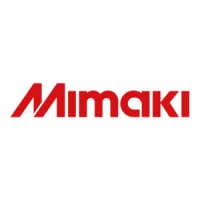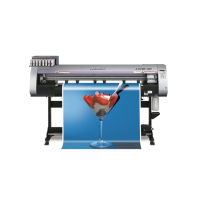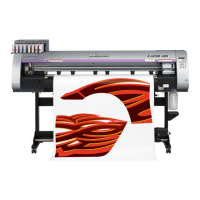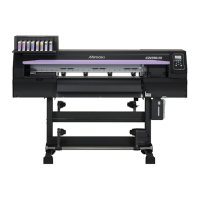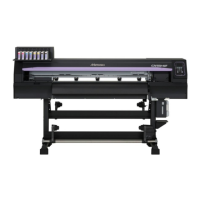Do you have a question about the MIMAKI CJV300-130 and is the answer not in the manual?
Explains the meaning of various symbols used in the manual for safe operation and prevention of damage.
Provides critical warnings for safe operation, including power cable handling, environment, and self-repair prohibition.
Warns about keeping body parts away from moving parts and avoiding flammable substances near the machine.
Details precautions for machine installation, including environmental conditions and safety interlocks.
Covers selecting installation space, environmental temperature, and safe procedures for moving the machine.
Identifies and describes the functions of various parts on the front side of the machine.
Identifies and describes components located on the rear and right side of the machine.
Explains the operation panel, display items, status indicators, and ink status icons.
Provides instructions for connecting the USB 2.0 interface cable and the power cable.
Details the process of inserting ink cartridges and understanding ink cartridge status indicators.
Covers precautions for handling ink cartridges and media, including usable media sizes.
Describes the different modes of the machine: NOT-READY, LOCAL, MENU, and REMOTE.
Outlines the fundamental steps in the printing process, from power management to data handling.
Details the procedures for turning the machine's power on and off, including safety precautions.
Covers setting media, adjusting head height, and adjusting pinch roller positions for optimal media handling.
Provides step-by-step instructions for setting a roll media onto the machine's hanger.
Explains how to set leaf media, which does not require retaining with roll holders.
Details how to change the printing origin and adjust temperature settings for the heaters.
Guides users through performing test prints to check for defects and executing head cleaning.
Explains how to correct media feed amount for better print quality and adjust dot positions.
Covers starting a printing operation, transmitting data from a PC, and handling printing data errors.
Details operations for stopping printing, clearing received data, and cutting media at any position.
Outlines the workflow for cutting and provides instructions for installing cutting tools like the cutter and pen.
Explains how to set cutting speeds, pressures, and offsets for different tools and media types.
Guides users on executing test cuts to confirm tool conditions and troubleshoot common cutting issues.
Covers starting cutting operations after setup and setting the origin point for cutting data.
Introduces the SETUP MENU and its navigation for setting print conditions.
Provides a comprehensive table of available setup items, their values, defaults, and outlines.
Details media correction for feed amount and dot position adjustment for bidirectional printing.
Explains how to configure heater temperatures and logical seek settings for improved operation.
Covers settings for ink drying time, left/right margins, and vacuum fan absorbability.
Details settings for media feed speed, automatic cleaning intervals, and interval wiping.
Introduces the MACHINE SETUP MENU for common machine settings and navigation.
Provides a table detailing machine setup functions like power-off, take-up unit, language, and network settings.
Explains how to configure automatic power-off and the take-up unit settings.
Covers settings for displaying media residual and changing the machine's display language.
Details network setup and configuring event mail functions for notifications.
Guides on sending test emails and provides solutions for various error codes encountered during email transmission.
Explains how to reset setup, maintenance, and machine settings to their default states.
Details operations related to the nozzle missing detection function and information menu.
Describes the nozzle check process during printing and actions for nozzle missing or errors.
Covers settings for printing check, automatic nozzle recovery, and judgment conditions for nozzle missing.
Introduces the INFORMATION MENU for confirming machine information and displaying data.
Explains how to access and display detailed machine information, including usage statistics and error history.
Covers creating registration marks, inputting data, and detecting marks for precise cutting.
Details areas for arranging registration marks and designs, and explains causes of wrong detection.
Provides recommendations on registration mark size, distance, and color for accurate detection.
Explains the settings required for detecting registration marks, including size, offset, and type.
Details the process of detecting registration marks using the machine's sensors and settings.
Introduces the CUTTING MENU and its sub-menus for various cutting operations.
Lists and describes the various functions available within the CUTTING MENU.
Explains how to set the cutting quality mode (Standard, High speed, High quality).
Covers setting distance compensation to correct errors in cut length and sheet alignment.
Details how to perform multiple cuttings of the same data on different sheets or sections.
Introduces the SETUP SUB MENU for convenient cutting functions like division and dummy cuts.
Explains how to divide large data for cutting by width or feeding direction to fit media limits.
Covers setting the OVER CUT function for media without uncut areas and other setup options.
Explains how to reset setup values and access maintenance functions for cutting accuracy.
Guides on performing sample cuts to diagnose and find the cause of cutting errors.
Details the automatic media-cutting function to divide media into pieces of a specified length.
Explains how to adjust misalignment between printed images and cutting lines without register marks.
Provides essential precautions for machine maintenance, including cleaning solutions and safety measures.
Details procedures for cleaning the machine's exterior surfaces and the platen.
Explains how to clean the media sensors and the media press to ensure proper media feeding.
Introduces the MAINTENANCE MENU and provides an overview of its functions and navigation.
Covers maintaining the ink cap and wiper, including cleaning procedures and required tools.
Details procedures for washing head nozzles and ink discharge passages to prevent clogging.
Explains the custody wash procedure for machines not used for extended periods.
Provides instructions for carefully cleaning the ink head and the area around it.
Explains how to use the nozzle recovery function to substitute for faulty nozzles.
Details how to set intervals for automatic refreshing, tube washing, and cleaning operations.
Covers procedures for filling ink to correct nozzle clogging and maintaining white ink.
Guides on replacing consumables like wipers and waste ink tanks, including confirmation messages.
Details the process of replacing the cutter blade and adjusting its protrusion for optimal cutting.
Provides initial checks for common issues like power, printing start, media jamming, and temperature.
Addresses problems related to poor image quality, clogged nozzles, and ink cartridge warnings.
Explains how to display and interpret descriptions of ink cartridge errors.
Lists warning messages related to operations and general machine status, with causes and solutions.
Details specific error messages, their causes, and recommended solutions for PCB and communication errors.
Explains causes and solutions for SYSTEM HALT errors, including data remain and parameter issues.
Lists detailed specifications for the printer section, including print head, modes, and ink usage.
Details specifications for the cutter section, including speed, pressure, and usable tools.
Provides common specifications for both models, covering media handling, interface, safety, and environment.
Details ink specifications for sublimation dye and solvent inks, including color, capacity, and storage.
Illustrates the correct order for setting ink cartridges based on the model and ink type.
Provides a form to fill out for reporting troubles and abnormal functions to the sales office.
